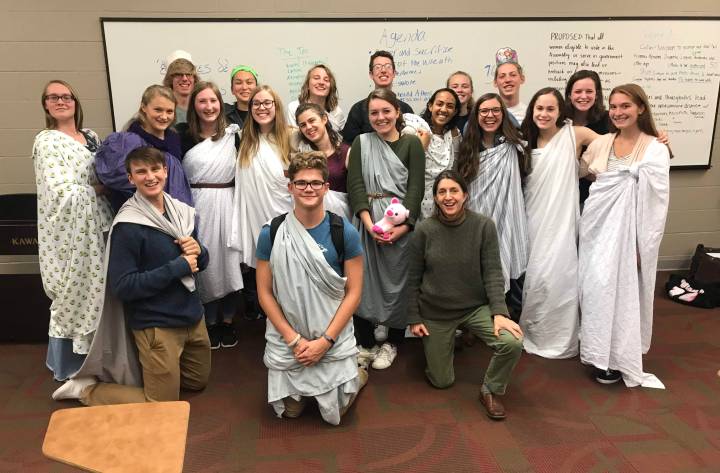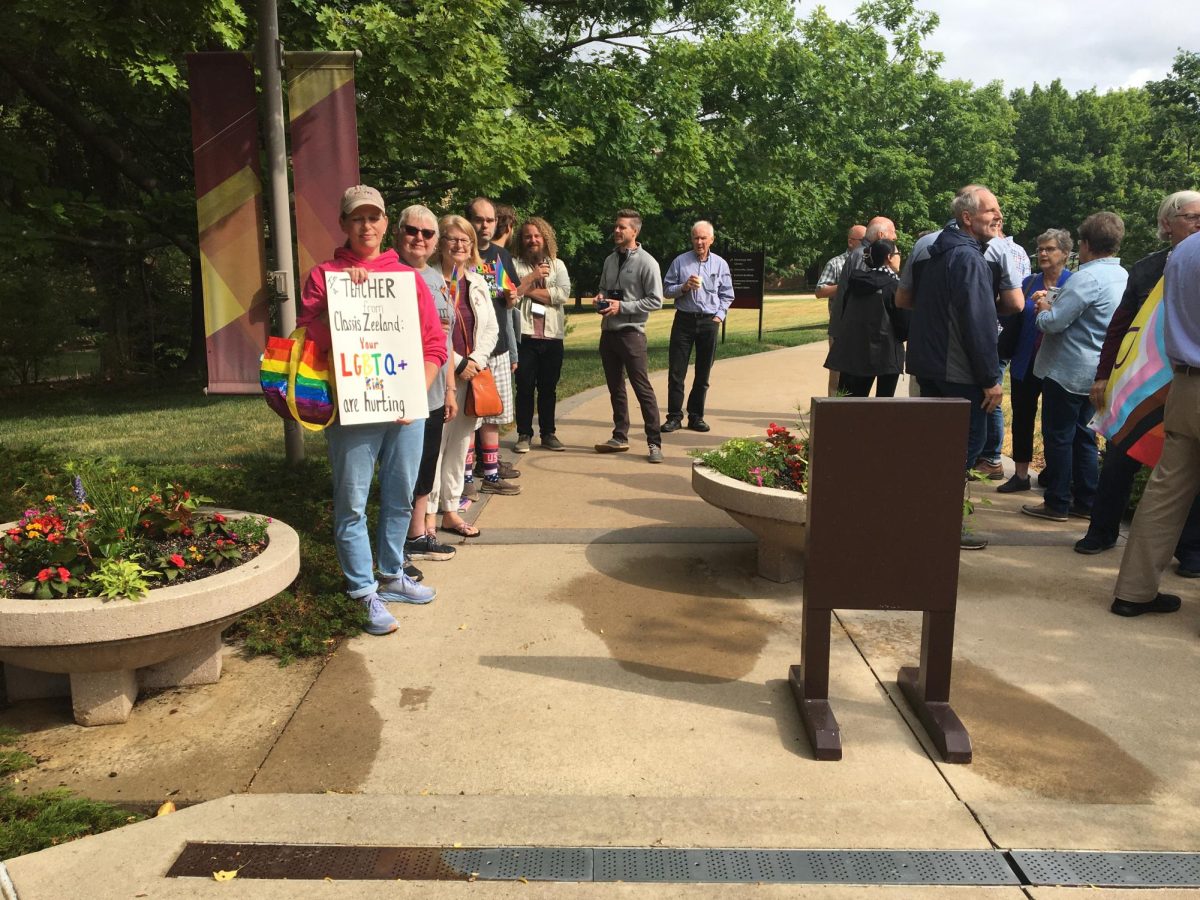After years of changes within the program and across the university’s core, Calvin’s honors program is working to stabilize and better the student experience with another curriculum change that is really “leaning back into the interdisciplinarity piece,” according to Amy Wilstermann, director of the honors program and co-chair of the biology department.
The new changes to the program curriculum will offer students more flexibility in their schedules, allowing more room for interdisciplinary courses and a chance for students to take classes together. These changes will also allow honors students to make more connections between departments, so students who desire more interdisciplinary work can rely on those connections to find it, according to Wilstermann.
Adapting to university-wide curriculum changes
The honors program is one of many cohort-based models of learning at Calvin. Cohorts are a way for students to be part of a closer community with people who share a common interest, according to the Calvin website. The honors program in particular is meant to “nurture a sense of excellence, curiosity and exploration across disciplinary boundaries within a committed community of student and faculty scholars,” according to their website. Several students live on the same floor of KHvR, while others are scattered around other dorms on campus.
The Honors program curriculum has shifted frequently since the 2024 incoming class began their college career back in 2020, largely as a response to wider curricular modifications across the university. “Calvin has made a number of significant changes and then pivoted very quickly to implement those changes,” Craig Hanson, art history professor and associate director of the honors program, said.
These institutional modifications include alterations to the core curriculum and the number of credits needed to graduate, which were implemented in 2020, according to past Chimes reporting. More recently, core has been changed once again and the university switched to a 2/4 credit system. “The program has a pretty significant curricular piece to it. More than half of that curriculum is alternative core courses. And so when the core has gone through several changes, we’ve needed to respond,” Wilstermann said.
Student concerns
Against this backdrop of instability, students in the cohort have concerns about cohort community, frequent curriculum change and a perceived decreasing focus on interdisciplinarity.
During COVID-19, honors classes “allowed [honors students] to access community in a way that wouldn’t otherwise be possible,” said Annalise Holcomb, a current honors senior studying psychology and civil engineering. However, a strong community also created “some contention.” After two years, “I felt quite close and connected with many of my peers, and ready to get a break from them, all at the same time,” Holcomb told Chimes.
To freshman Caleb Ausema, the way the program is structured created problems with culture and community building. According to Ausema, an honors student studying computer science, the floor community (located on 3rd VanReken) is “a little insular,” as it can be hard to get connected outside of that community. “Part of that is definitely our doing. It’s comfortable to walk out into our lobby and say hi to people, less comfortable to go [to] other places,” Ausema said.
Even within a close-knit community, some found it hard to find a place in honors. “I struggle[d] to relate to many of the other students in the program,” Caedmon Morgret, a senior studying biology and geography, told Chimes. Morgret cited a “general disinterest” in debates and arguments over American politics and social justice issues, preferring “relating to people” rather than “outsmarting them.”
Holcomb also said that the honors culture sometimes led to “high levels of unnecessary competition or perfectionism.” These perfectionistic standards, to students like Holcomb, can become “overwhelming and discouraging.”
These experiences are not universal. Julia VanderMolen, director of cohorts and special assistant to the provost, described the positive feedback she has gotten about community within the honors classrooms. “I’ve heard from the faculty who teach this [freshman] class, that this is a really strong class and they’ve really enjoyed how the students have just kind of jumped in. At the beginning of the semester you can kind of have that ‘nobody likes to talk, nobody knows each other’ so it’s really weird, and I heard early on that we skipped that,” VanderMolen said.
Classes are one place where students often find things to enjoy. Morgret said that despite not always loving his classes, there was “a lot of beneficial information and experiences” to be taken away from them. “I think in that sense the program offered me an excellent opportunity to broaden my perspectives from outside my disciplines. I had many good conversations with some of my professors, which were wonderfully supplemental to the classes,” Morgret said.
The program’s ability to create a cross-disciplinary experience is one of the main draws to the honors program. Morgret said that the interdisciplinary and co-taught classes “defined what being ‘honors’ was” for students. “Amy and Craig put a lot of work into crafting the program for its students. I think their efforts genuinely made the program worth it, if nothing else,” Morgret said.
Honors students like Theo Perumal, a senior studying computer science, said he understood why the situation changed over the years, but hopes that the program would return to more co-taught, interdisciplinary classes. Auesma agreed and wants the program to lead harder into interdisciplinary work in the coming years.
The benefits of a well run program
“What we’re all trying to do at Calvin is to create opportunities for students to look at things from different sets of questions, different vocabularies, different theories about how the world works, different knowledge procedures…the honors program in general gives us that opportunity,” Lew Klatt, English professor, told Chimes.
According to Klatt, several of the honors classes have had two professors teaching the class. He described how for the first three years of teaching honors students, he worked with Kate van Liere, a history professor.
“It’s neat because Kate asks different kinds of questions than I do. She always wanted chronology and I just wanted the text. It really helped me appreciate context a little bit more,” Klatt told Chimes. Throughout the years, Klatt has taught honors classes with different professors. According to Klatt, each class has helped remind himself and students that “Education happens not in isolation but when we try to figure out where we are in the world.”
Asha Snader, a current freshman studying psychology, said, “I was quite nervous about the difficulty level of honors because I had heard that it was challenging.” Now, Snader finds the classes quite manageable. “It does require a lot of work, but it isn’t an overwhelming amount, in my opinion,” Snader said.
Ausema, among other students, told Chimes that honors students are often typecast as STEM students, which is a stereotype he wants to challenge. While many students in his honors classes are STEM students, Klatt said he has encountered a variety of majors. And honors classes often allow STEM students the opportunity to think and interact more artistically. “It’s a great break from the monolithic way of seeing that sometimes happens in any of our disciplines,” Klatt said.
Looking to the future
“It’s not easy. It’s not easy for any of us, so I completely understand students feeling confused or frustrated with some of that [change within the program],” said Wilstermann.
Hanson and Wilstermann have maintained advising pages to help students navigate across different requirements and have encouraged students to talk with honors advisors if they have concerns, with the hope of making confusing changes as clear as possible. “We have students from all over campus who are participating in the program, which means that we’re responding to larger university decisions,” Hanson told Chimes. “It means that our window for responding to those changes has been even shorter than the larger university timeframe.”
University-wide decisions are out of their control, but Hanson and Wilstermann are still working to improve the student experience.
The changes will allow for more options for students to take cross-disciplinary courses in disciplines they are interested in as well as opportunities to work with other departments. The curriculum change will also add a one-credit capstone course for honors students to allow “our students to have at least one course all together,” according to Wilstermann.
This next shift will also align with the 2-4 credit transition Calvin’s curriculum underwent at the beginning of fall semester, according to Hanson. “Having a two-hour course paired with a two-hour course makes sense, and it also makes sense as a four-hour course intertwined over the course of the semester,” Hanson told Chimes.
“I can’t wait for the day [when] the honors program doesn’t have to change every year,” Holcomb said. “That stability and ability to develop will be welcomed. I think that this would help with many of the stressors of the honors program.”






